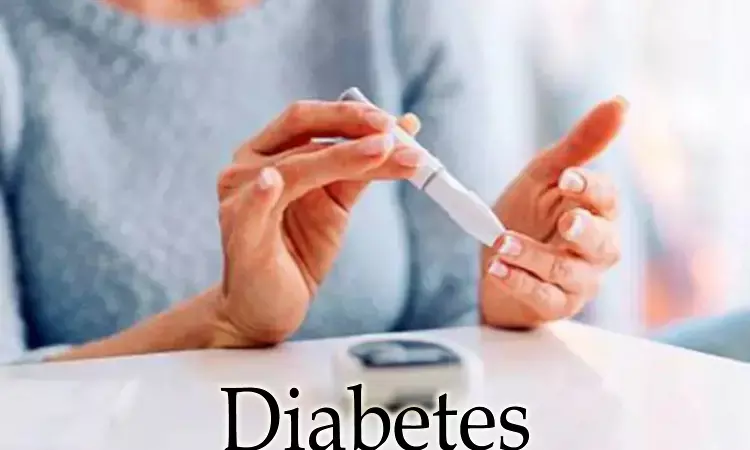- Home
- Medical news & Guidelines
- Anesthesiology
- Cardiology and CTVS
- Critical Care
- Dentistry
- Dermatology
- Diabetes and Endocrinology
- ENT
- Gastroenterology
- Medicine
- Nephrology
- Neurology
- Obstretics-Gynaecology
- Oncology
- Ophthalmology
- Orthopaedics
- Pediatrics-Neonatology
- Psychiatry
- Pulmonology
- Radiology
- Surgery
- Urology
- Laboratory Medicine
- Diet
- Nursing
- Paramedical
- Physiotherapy
- Health news
- Fact Check
- Bone Health Fact Check
- Brain Health Fact Check
- Cancer Related Fact Check
- Child Care Fact Check
- Dental and oral health fact check
- Diabetes and metabolic health fact check
- Diet and Nutrition Fact Check
- Eye and ENT Care Fact Check
- Fitness fact check
- Gut health fact check
- Heart health fact check
- Kidney health fact check
- Medical education fact check
- Men's health fact check
- Respiratory fact check
- Skin and hair care fact check
- Vaccine and Immunization fact check
- Women's health fact check
- AYUSH
- State News
- Andaman and Nicobar Islands
- Andhra Pradesh
- Arunachal Pradesh
- Assam
- Bihar
- Chandigarh
- Chattisgarh
- Dadra and Nagar Haveli
- Daman and Diu
- Delhi
- Goa
- Gujarat
- Haryana
- Himachal Pradesh
- Jammu & Kashmir
- Jharkhand
- Karnataka
- Kerala
- Ladakh
- Lakshadweep
- Madhya Pradesh
- Maharashtra
- Manipur
- Meghalaya
- Mizoram
- Nagaland
- Odisha
- Puducherry
- Punjab
- Rajasthan
- Sikkim
- Tamil Nadu
- Telangana
- Tripura
- Uttar Pradesh
- Uttrakhand
- West Bengal
- Medical Education
- Industry
High fasting blood sugar levels tied to increased risk of heart failure: Study

USA: Middle-aged White adults and Black women with prediabetes are at increased risk of heart failure (HF) for lifetime, finds a recent study in the journal Cardiovascular Diabetology. Further, the researchers found the association to be attenuating in older Black women and they found black women with diabetes to have the highest lifetime risk of heart failure (HF).
Given the increasing prevalence of disparities and dysglycemia in HF burden, Sadiya S. Khan, Northwestern University Feinberg School of Medicine, Chicago, IL, USA, and colleagues aimed to determine race- and sex-specific lifetime risk of HF across the spectrum of fasting blood sugar (FBS).
For the purpose, the researchers pooled individual-level data from adults without baseline HF from 6 population-based cohorts. Modified Kaplan–Meier analysis, Cox models adjusted for the competing risk of death, and Irwin's restricted mean were used to estimate the lifetime risk, adjusted hazard ratio (aHR), and years lived free from HF in middle-aged (40–59 years) and older (60–79 years) adults with FPG < 100 mg/dL, prediabetes (FPG 100–125 mg/dL) and diabetes (FPG ≥ 126 mg/dL or on antihyperglycemic agents) across race-sex groups.
Key findings of the study include:
- In 40,117 participants with 638,910 person-years of follow-up, 4846 cases of incident HF occurred.
- The lifetime risk of HF was significantly higher among middle-aged White adults and Black women with prediabetes (range: 6.1% to 10.8%) compared with normoglycemic adults (range: 3.5% to 6.5%).
- Middle-aged Black women with diabetes had the highest lifetime risk (32.4%) and aHR (4.0) for HF across race-sex groups.
- Middle-aged adults with prediabetes and diabetes lived on average 0.9–1.6 and 4.1–6.0 fewer years free from HF, respectively.
- Findings were similar in older adults except older Black women with prediabetes did not have a higher lifetime risk of HF.
"Prediabetes was associated with higher lifetime risk of HF in middle-aged White adults and Black women, with the association attenuating in older Black women," wrote the authors. "Black women with diabetes had the highest lifetime risk of heart failure (HF) compared with other race-sex groups."
Reference:
The study titled, "Association of fasting glucose with lifetime risk of incident heart failure: the Lifetime Risk Pooling Project," is published in the journal Cardiovascular Diabetology.
DOI: https://cardiab.biomedcentral.com/articles/10.1186/s12933-021-01265-y#Sec14
Dr Kamal Kant Kohli-MBBS, DTCD- a chest specialist with more than 30 years of practice and a flair for writing clinical articles, Dr Kamal Kant Kohli joined Medical Dialogues as a Chief Editor of Medical News. Besides writing articles, as an editor, he proofreads and verifies all the medical content published on Medical Dialogues including those coming from journals, studies,medical conferences,guidelines etc. Email: drkohli@medicaldialogues.in. Contact no. 011-43720751


